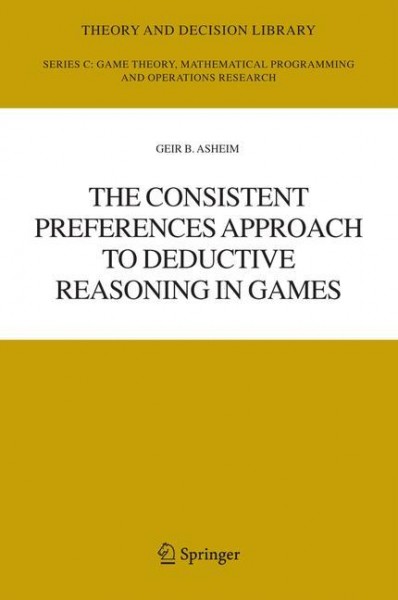
The Consistent Preferences Approach to Deductive Reasoning in Games
Kurzinformation
inkl. MwSt. Versandinformationen
Artikel zZt. nicht lieferbar
Artikel zZt. nicht lieferbar

Beschreibung
During the last decade I have explored the consequences of what I have chosen to call the 'consistent preferences' approach to deductive reasoning in games. To a great extent this work has been done in coop eration with my co-authors Martin Dufwenberg, Andres Perea, and Ylva Sovik, and it has lead to a series of journal articles. This book presents the results of this research program. Since the present format permits a more extensive motivation for and presentation of the analysis, it is my hope that the content will be of interest to a wider audience than the corresponding journal articles can reach. In addition to active researcher in the field, it is intended for graduate students and others that wish to study epistemic conditions for equilibrium and rationalizability concepts in game theory. Structure of the book This book consists of twelve chapters. The main interactions between the chapters are illustrated in Table 0.1. As Table 0.1 indicates, the chapters can be organized into four dif ferent parts. Chapters 1 and 2 motivate the subsequent analysis by introducing the 'consistent preferences' approach, and by presenting ex amples and concepts that are revisited throughout the book. Chapters 3 and 4 present the decision-theoretic framework and the belief operators that are used in later chapters. Chapters 5, 6, 10, and 11 analyze games in the strategic form, while the remaining chapters-Chapters 7, 8, 9, and 12-are concerned with games in the extensive form. von Asheim, Geir B.
Produktdetails

So garantieren wir Dir zu jeder Zeit Premiumqualität.
Über den Autor
Geir B. Asheim is Professor of Economics at the University of Oslo, Norway. In additional to investigating epistemic conditions for gametheoretic solution concepts, he is doing research on questions relating to intergenerational justice.

- Hardcover
- 358 Seiten
- Erschienen 2011
- Routledge

- paperback -
- Erschienen 2003
- De Gruyter Oldenbourg

- Kartoniert
- 216 Seiten
- Erschienen 2013
- Birkhäuser

- Kartoniert
- 176 Seiten
- Erschienen 2018
- TibiaPress

- hardcover
- 333 Seiten
- Erschienen 2004
- Springer

- paperback
- 224 Seiten
- Erschienen 2016
- Springer

- Kartoniert
- 544 Seiten
- Erschienen 2005
- Springer

- hardcover
- 440 Seiten
- Erschienen 2001
- Springer

- hardcover
- 460 Seiten
- Erschienen 1995
- Academic Press Inc

- Kartoniert
- 178 Seiten
- Erschienen 2018
- Springer

- Gebunden
- 652 Seiten
- Erschienen 2013
- Springer



































